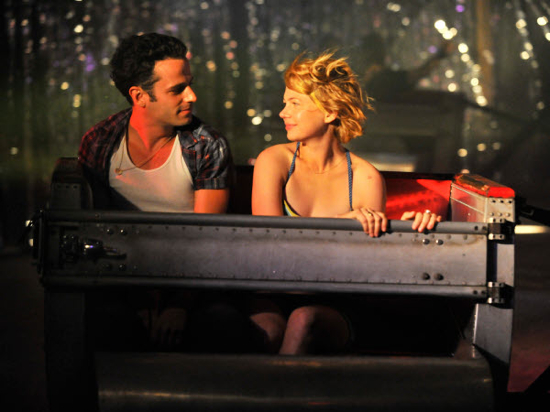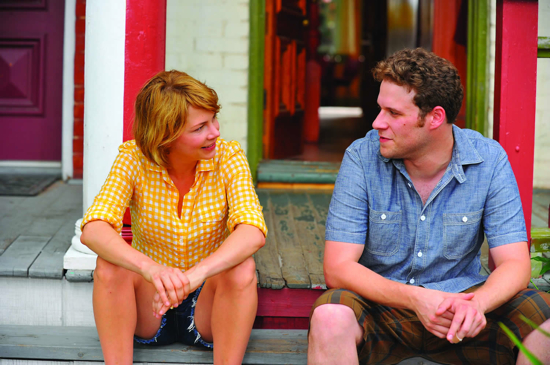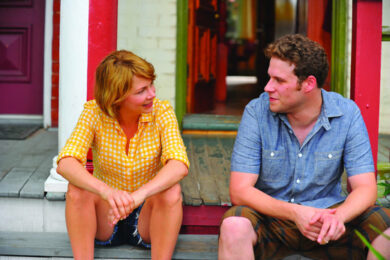Take This Waltz, Sarah Polley’s directorial follow up to 2006’s Away From Her, takes its title and theme from a Leonard Cohen song (itself a loose translation of a Federico García Lorca poem). Cohen’s song, laced with ravishing paradoxes and delicious ambiguities, is about the ultimate dilemma a man experiences when loving a beautiful woman: one wants to show her to the world, but fears the world might just take her for its own.
There’s a concert hall in Vienna
Where your mouth had a thousand reviews
There’s a bar where the boys have stopped talking
They’ve been sentenced to death by the blues
Ah, but who is it climbs to your picture
With a garland of freshly cut tears?
Polley takes this idea and shifts the point of view to the woman caught in the middle. Her film is about the relationship between looks, lust and love and the difficulties of settling for what you have. Margot (Michelle Williams) seems secure and happy in the fifth year of her marriage to Lou (Seth Rogen), "the kindest, gentlest person in the world" and something of an all-round safe bet. That is until, through a series of improbable coincidences, she bonds with Daniel (Luke Kirby), an artistic free spirit who makes an equally improbable living running around with a rickshaw. Like Cohen in the song, from the moment Daniel and Margot meet, Lou – although he is for the most part oblivious – can only trust (hope) that his woman is true.
Polley’s script is full of cornball lines – Williams’ character actually says, "I’m afraid of being afraid" – and it contains some spectacularly misjudged scenes. In what can only be construed as an attempt to emphasise the chaste nature of their courtship, Daniel spends about five minutes describing to Margot the sexual acts he dreams of performing on her, and you squirm through every second of his crude fantasy. And when we finally do hear Cohen’s baritone playing over the soundtrack it’s accompanied by a spiralling, time-lapse sex montage which seems completely at odds with the tone of the rest of the film.
Yet there’s something amazingly sincere about the way it addresses the problems of romance and desire. Among the clichés and clangers, Polley inserts brilliant little visual metaphors which say more than the dialogue ever does. One sees Margot and Daniel (and the camera) whirled round in a fairground waltzer (geddit?) to The Buggles’ ‘Video Killed the Radio Star’. The centrifuge slides the pair close together, apart, and then back closer still – the physical tension palpable. But the scene subverts our expectations and is played to a beautiful anticlimax: the ride stops before the song finishes or the couple kiss. Another has Margot listening to a song indoors, Lou watching her through a window from the porch. Margot nods her head to the beat, miming the lyrics, but Lou can’t keep time with the rhythm, can’t make out the words.
It is perhaps little surprise that for a film written and directed by an actress, Take This Waltz features some excellent acting. Seth Rogen shows he’s more than just a ‘Hollywood funnyman’ and Sarah Silverman plays Lou’s recovering alcoholic sister Geraldine with aplomb. At the centre, though, is another bravura performance from Michelle Williams. Beneath Margot’s cutesy, twee facade we see a woman filled with doubt and desire striving to do the right thing (by her husband, by her paramour) but wondering all the while what the right thing is for her. Williams’ performance – so subtle, so nuanced – draws us into Margot’s plight without ever forcing us to pass judgement on the character, instead showing us the complexities of the situation.

That said, the picture stumbles on one terrible performance. Luke Kirby as Daniel rarely works. He has little chemistry with Williams, and represents an off-the-rack version of a romantic bohemian rather than something tailored to the film itself. Daniel is supposed to be a free-spirited artist but the only real evidence we’re given as to his creativity are a few god-awful ersatz expressionist paintings littering his house. The actor’s perhaps caught a bad break as his character seems to have copped the majority of the film’s most cringeworthy moments, but elsewhere strong performances carry you through the script’s choppier waters; Kirby just seems all at sea.
Now, in a movie where the central quandary is whether to stick on a safe but boring marriage or twist on the promise of a passionate assignation, it becomes a fairly major problem when the trump card turns out to be a joker. A joker pulling a rickshaw. Daniel is meant to represent the lush lawn next door, tempting Margot over the palisade, away from domestic contentment. Well here, for Margot, the neighbour’s grass is so patently not greener – rather it’s burnt, brownish and full of potholes – that it is very difficult to believe she would even cast admiring glances at next door’s turf, let alone hop the fence. At one point Margot turns to Daniel and flirtatiously calls him "infinitely hateable". She doesn’t mean it, but she should, because he is.
Ultimately, it is with the character of Daniel and Kirby’s portrayal of him that Take This Waltz falls down. It might be that any man brazenly pursuing a married woman is at least a little nefarious. It might be that the grass isn’t actually always greener on the other side. But the point is, it sure as hell looks it, otherwise you don’t go tearing over there to see what’s what without worrying about the gate slamming shut behind you. Trying to keep things as objective as possible, if a third of the screen time is given up to an incredibly irritating, foppish pseudo-creative and the film views said fop as a paragon of the aphrodisiac alternative to domestic life, you can’t help but think: Why bother? Stay at home with the Horlicks.



